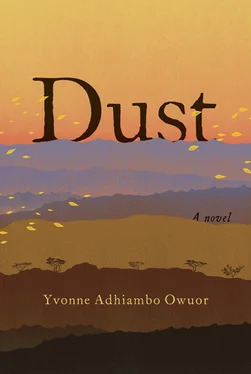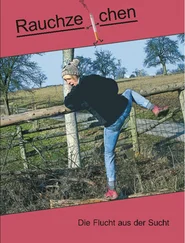Three hours later, bleary-eyed and raspy-voiced, Petrus retrieved Ali Dida Hada’s personal mobile number from one of his four phones.
“Rotting on the job,” Petrus had accused him when he answered. “Where were you?” he asked. “The boy died last night — where were you?” He hiccupped.
Ali Dida Hada asked, “Who?”
“Oganda, who else?” slurred Petrus.
Ali Dida Hada had not spoken for about a minute. Then he swallowed audibly. After that, he had switched off his phone.
Ajany memorizes the details she would need to carve Petrus’s profile into black-ice stone. She would pound in jagged craters to reveal ravenous eyes of fathomless reach. Black holes.
Petrus senses her gaze probing his mind. Refuge in an image. “I’ll keep this.” Petrus folds Odidi’s poster and tucks it back into his coat. This is a dense land, he thinks, its memories a deluge that crave atonement. Petrus blinks himself alert. Now he is going mad.
A weary “Go home, Ms. Ajany, leave us alone. Go to your Brazil, today, tomorrow, but go away, please.”
Heavy exiting footsteps. At the reception, Petrus points at Jos with a snappy “Kijana!” Young man! On impulse, he bares his teeth: “Wee!”
Everything on Jos’s desk drops to the floor.
Petrus grins.
People!
He is sniggering when he unlocks his car door.
A pause. From his shirt pocket, he tugs at a small black notebook with a red pencil tucked inside. He chooses a blank page and carefully tears out a piece. He sketches something in. “Kijana!” he bellows in the direction of Jos, who dashes to him in a half-crouch.
He has gone, but Petrus’s shadow is a trap. Cold sensations crowd Ajany. Fear is a presence , Bernardo had hurled at her one night. “It penetrates beauty to deform it.” He had sung, “Eu quero que sejas bela” —I want you to be beautiful. Now a vile cord, woven out of writhing shadows, wraps itself around her neck. Bile throttles even the not many words she can speak. She is motionless in her chair.
A ROUGH, CRUMPLED MAP DRAWN ON A SCRAP OF PAPER.
She has found the place.
She scrapes fragments of her brother’s dried, rusted blood onto a small piece of paper. She scratches the potholed, gray-black tarmac of a Nairobi side road into which a driver has squashed a fat, mottled bullfrog. The frog’s life has contaminated the scene-of-crime. Does not matter. No witnesses apart from those who are consumed by an eternal vow of silence. The frog’s entrails poke out of the ground like a portent. She has just noticed the sullied petals of a crushed lily when the acrid loathing surges from her body, gushes out of her mouth, and mingles with the chaos on the ground.
A solitary wind trots in and brings a chill with it. She hears the echoes of a herdsman’s prayer after every one of his remaining sheep and goats had been torn apart by leopards in a horrible season of drought: The day I meet God, I’ll throw my spear at him .
She has poured water onto the wound in the ground, and scrubbed with her fingers and hands. But before she poured the water, she had bent over, rested her head on the warm tarmac, touched the memory blood with her face. Ears to the ground, listening and waiting. Becoming Odidi. Waiting, toppling over the limits of space, and as she stares at the below, she can see Odidi’s footsteps and they are turned toward Wuoth Ogik. Odidi! she whimpers.
Silence answers.
It bursts inside her.
Passersby, exhausted from running battles with false policemen, murderous gangs, double-tongued politicians, and priests of sorrow, think the smallish woman lying on the road is another of the well-dressed insane who from season to season appear from nowhere. Moreover, in an unreasonable season — when a nation has smoldered inside the small egos of broken men who would be kings, and when rabid men with spiked clubs circumcised small boys to death, and seventeen heads without bodies were roadblocks across a national highway, and people used ballpoint pens to accuse next-door neighbors who would then be slaughtered and burned while they sorted out the earthly goods they wanted from their homes — a small woman scrubbing blood off a potholed road is nothing to marvel at.
She will keep vigil over a spot of road. Wash it. Cleanse the condemnation, the persistent loneliness of a brother. Savoring hatred. An approaching orange cement lorry honks. Seeing it, she admits to helplessness before this thing that has no words.
Honk!
Simple thing, this lying down: dropping it all, even the anger. Allow, become tarmac. Become nothing.
From the inside of a red kiosk, seated on a high stool, a pregnant woman spies on Ajany, her hand resting on her rounded stomach. The woman has come to the site of Odidi’s death daily. At her first visit, she was furtive and frightened, but now this pilgrimage is just one of the things she does with her life, like drinking tea at ten o’clock. It was she who had left the lily there. For her, Odidi is not fully out of reach. When she can sleep, in the middle of dreaming, she knows his arms envelop her, her head is tucked into his chest, and she hears his heart beating. She did not know that death could be this hemorrhaging sob that makes opening her eyes a daily battle.
She knows who the woman crawling on the tarmac is. Does not trust her. His blood should belong to her , hers to decide when to clean. Eyes squint. She watches Ajany. She makes a decision. She leans forward on her stool to tap the kiosk owner’s shoulder.
A stocky hairdresser with big arms grabs Ajany by the upper arm. “Babi!” she yells, dragging her from the approaching orange lorry, which groans past them. “Saitan!” spits the woman. “Ashindwe!”
Ajany focuses on the thick grizzle covering the woman’s chin, how it disappears into her neck. The big woman tugs at the ends of Ajany’s hair, stretches out her lips, and makes a sucking sound.
“Mbaya. Mbayaaaa!” she tuts.
Firm, warm, hard hands lead Ajany into the salon she spurned before.
Water drains through a hole in a black plastic sink beneath which a cracked blue bucket waits. Ajany watches the escape of a blend of unknown shampoo, butter-smelling conditioner, hair dirt, and warm water. Large, tough, firm hands press her neck down. Ajany cannot move. Rub and twist and comb and rinse. Soap in her eyes. The sting is good. Water in her eyes. Smell of black-woman hair things, smoke, liquids, heat, and strands. Chatter in the room.
Politics, where politicians have names linked to habits: The drunkard whose wife beats him? The slut who has three children with his secretary? The drug dealer running after the newsreader who is younger than his daughter? Which one? The fool who shot his driver? The election bandit? The murderer found dead in his pool? Mocking laughter. If-these-men-cannot-keep-their-families-how-will-they-keep-the country? The question boomerangs. They retreat to the theme of fashion. A new clothing-and-shoe shop. Fallen-off-a-ship designer wear. Crime. Ayayayaya! Whispered, “Walimpata.” They got him. “Good.” “The betraying insect.”
The big woman rubs Ajany’s hair dry, reaches for a clothesline of hair pieces, and picks a thin strand to twist into it. Another young woman, with doe-brown eyes, walks in and pulls a strand, starts on the left side of Ajany’s head. Ajany’s head, swung this way and that, tingles.
“ Songa Aunty.”
Not “Babi” anymore.
The woman stands in between Ajany’s legs to braid the center of her head. Tilts her roughly so that another woman, who has moved a white stool close to her low chair, can roll hair strands on a darkened and hardened thigh. Casual intimacy.
Читать дальше











